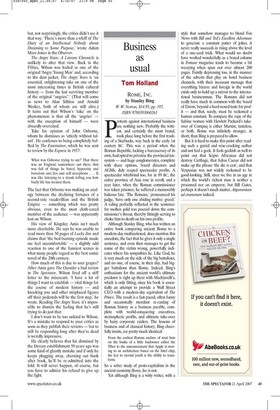Business as usual
Tom Holland
ROME, INC. by Stanley Bing W. W. Norton, $14.95, pp. 197, ISBN 9780393060263 Protests against international business are nothing new. Probably the wittiest, and certainly the most brutal, took place long before the first trashing of a Starbucks, way back in the early 1st century BC. This was a period when the Roman Republic, lacking a bureaucracy of its own, had opted to privatise the provincial taxsystem — and huge conglomerates, complete with share options, board directors and AGMs, duly reaped spectacular profits. A spectacular whirlwind too, for in 89 BC, the entire province of Asia rose in revolt, and a year later, when the Roman commissioner was taken prisoner, he suffered a memorably hideous fate. ‘The Romans,’ pronounced his judge, ‘have only one abiding motive: greed.’ A ruling perfectly reflected in the sentence: for molten gold was poured down the commissioner’s throat, thereby fittingly serving to choke him to death on his own profits.
Although Stanley Bing, who has written an entire book comparing ancient Rome to a modern-day multinational, does mention this anecdote, the fact that he gives it only a single sentence, and even then manages to get the name of the victim wrong, powerfully indicates where his sympathies lie. Like God, he is very much on the side of the big battalions, and no one, of course, in their day, had bigger battalions than Rome. Indeed, Bing’s enthusiasm for the ancient world’s ultimate predator is right up there with Machiavelli’s, which is only fitting, since his book is essentially an attempt to provide a Wall Street CEO with a modern-day equivalent of The Prince. The result is a fast-paced, often funny and occasionally mordant re-casting of Roman history as a business parable, complete with world-conquering executives, stratospheric profits, and ultimate take-over by hairy corporate raiders. The lessons of business and of classical history, Bing cheerfully insists, are pretty much identical:
From the earliest Roman enclave of mud huts on the banks of a little backwater called the Tiber to the announcement that Apple is moving to an architecture based on the Intel chip, the key to eternal youth is the ability to transform.
So a sober study of proto-capitalism in the ancient economy Rome, Inc is not.
Yet although Bing is a witty writer, with a style that somehow manages to blend Fox News with Bill and Ted’s Excellent Adventure to generate a constant patter of jokes, it never really succeeds in rising above the level of a one-card trick. What would no doubt have worked wonderfully as a boxed column in Fortune magazine tends to become a bit wearying when spun out over almost 200 pages. Faintly depressing too, in the manner of the adverts that play on hotel business channels, with their incessant message that everything bizarre and foreign in the world exists only to hold up a mirror to the international businessman. The Romans did not really have much in common with the board of Enron, beyond a hard-nosed taste for profit — and that, surely, must be reckoned a human constant. To compare the rape of the Sabine women with Hewlett Packard’s takeover of Compaq is either Marxist, tasteless, or both. Rome was infinitely stranger, in short, than Bing is prepared to allow.
But it is hard to make this point after reading such a genial and wise-cracking author and not feel a geek. It feels geekish as well to point out that Scipio Africanus did not destroy Carthage, that Julius Caesar did not make up the phrase ‘the die is cast’, and that Vespasian was not widely reckoned to be good-looking. Still, since we live in an age in which the world’s richest man is neither a proconsul nor an emperor, but Bill Gates, perhaps it doesn’t much matter. Argumentum ad crumenam indeed.


















































































 Previous page
Previous page